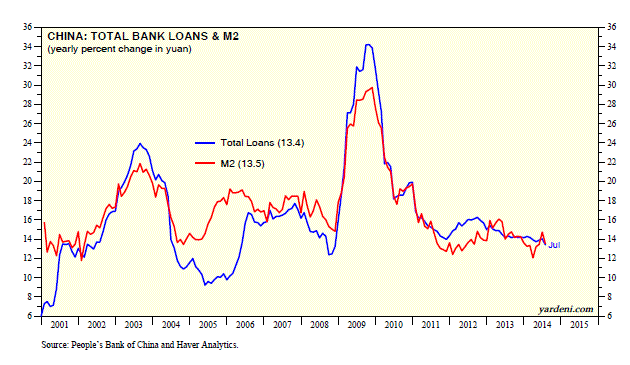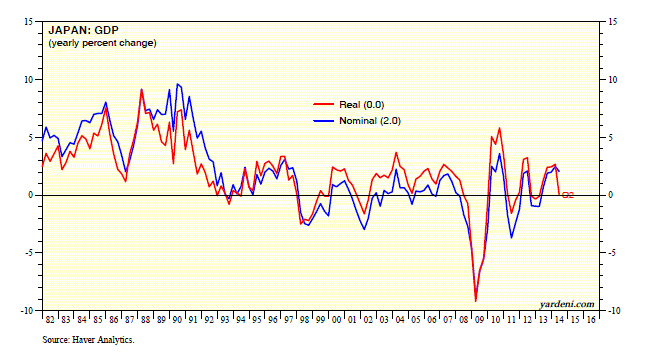
Last week there certainly was lots of bad news about the global economy. The Eurozone’s latest production and GDP numbers suggest that the lackluster recovery of the past year isn’t just stalling but may be turning into a recession. I think that the Ukraine crisis explains this downbeat turn of events. If it passes, as we expect it will soon, then the region’s weak recovery should resume. In addition, starting next month, the ECB will inject more funds into the Eurozone’s banking system with its “targeted longer-term refinancing operations” (TLTRO), as I discussed last week. (The details of the program were outlined in June 5 and July 3 press releases.)
The drop in Japan’s Q2 real GDP wasn’t a surprise. Much of the stimulus of Abenomics was more than offset by the hike in the sales tax on April 1. There is already chatter that more stimulus will be required. There was a surprise in China’s July report on social financing. It plunged, suggesting a significant slowdown in China’s economy. I am not convinced. Let’s have a closer look at some of the key indicators in the major overseas economies:
(1) China. Social financing during July was remarkably weak. It fell from $321 billion during June to $44 billion last month. That was the slowest pace of lending since October 2008. Bank loans dropped from $175 billion during June to $63 billion during July. We think this is a one-month aberration. However, it may be that lending to residential property builders has hit a brick wall as a glut of housing units is depressing prices. In any event, on a y/y basis, bank loans are up 13.4% y/y, in line with M2 growth.
(2) Japan. Real GDP fell 6.8% (saar) during Q2 in Japan. That’s after increasing 6.1% during Q1. Despite Abenomics, real GDP was unchanged on a y/y basis, and up just 2% in nominal terms. Private consumption plunged 18.7% during Q2. It’s not obvious why it wasn’t obvious to the government that mixing massive monetary and fiscal stimulus with a major tax hike was akin to stepping on the accelerator and the brakes at the same time. It’s a sure way to wind up in a ditch. Even capital spending fell 12.3%. Despite the weaker yen, exports fell 1.8%. It’s dismal.
(3) Eurozone. It’s also dismal in the Eurozone. That’s evident in bond yields, which continue to fall to historical lows. The German 10-Year government bond yield fell below 1.0% for the first time in history, down to only 0.97% on Friday. Perhaps the biggest shock last week was that Germany’s real GDP fell 0.6% (saar) during Q2. But that’s after it rose 2.7% during Q1, which was boosted by mild winter weather. However, weakness in the rest of the Eurozone is weighing on the region’s biggest economy and biggest exporter. So is the Ukraine crisis, which has been a slow-motion train wreck so far.
Today's Morning Briefing: State of the World. (1) America is exceptional. (2) US economy stands out. (3) Dismal news out of Eurozone and Japan. (4) Less bang per yuan in China. (5) Debt weighing down some major economies. (6) US economy is diversified with lots of world-class industries. (7) Many US industries remain relatively unregulated. (8) US news remains upbeat. (9) China’s social financing plunged in July. (10) Stepping on the accelerator and brakes in Japan. (11) German GDP drops after mild winter boost. (12) “Calvary” (+ + +).
The drop in Japan’s Q2 real GDP wasn’t a surprise. Much of the stimulus of Abenomics was more than offset by the hike in the sales tax on April 1. There is already chatter that more stimulus will be required. There was a surprise in China’s July report on social financing. It plunged, suggesting a significant slowdown in China’s economy. I am not convinced. Let’s have a closer look at some of the key indicators in the major overseas economies:
(1) China. Social financing during July was remarkably weak. It fell from $321 billion during June to $44 billion last month. That was the slowest pace of lending since October 2008. Bank loans dropped from $175 billion during June to $63 billion during July. We think this is a one-month aberration. However, it may be that lending to residential property builders has hit a brick wall as a glut of housing units is depressing prices. In any event, on a y/y basis, bank loans are up 13.4% y/y, in line with M2 growth.
(2) Japan. Real GDP fell 6.8% (saar) during Q2 in Japan. That’s after increasing 6.1% during Q1. Despite Abenomics, real GDP was unchanged on a y/y basis, and up just 2% in nominal terms. Private consumption plunged 18.7% during Q2. It’s not obvious why it wasn’t obvious to the government that mixing massive monetary and fiscal stimulus with a major tax hike was akin to stepping on the accelerator and the brakes at the same time. It’s a sure way to wind up in a ditch. Even capital spending fell 12.3%. Despite the weaker yen, exports fell 1.8%. It’s dismal.
(3) Eurozone. It’s also dismal in the Eurozone. That’s evident in bond yields, which continue to fall to historical lows. The German 10-Year government bond yield fell below 1.0% for the first time in history, down to only 0.97% on Friday. Perhaps the biggest shock last week was that Germany’s real GDP fell 0.6% (saar) during Q2. But that’s after it rose 2.7% during Q1, which was boosted by mild winter weather. However, weakness in the rest of the Eurozone is weighing on the region’s biggest economy and biggest exporter. So is the Ukraine crisis, which has been a slow-motion train wreck so far.
Today's Morning Briefing: State of the World. (1) America is exceptional. (2) US economy stands out. (3) Dismal news out of Eurozone and Japan. (4) Less bang per yuan in China. (5) Debt weighing down some major economies. (6) US economy is diversified with lots of world-class industries. (7) Many US industries remain relatively unregulated. (8) US news remains upbeat. (9) China’s social financing plunged in July. (10) Stepping on the accelerator and brakes in Japan. (11) German GDP drops after mild winter boost. (12) “Calvary” (+ + +).
3rd party Ad. Not an offer or recommendation by Investing.com. See disclosure here or
remove ads
.

